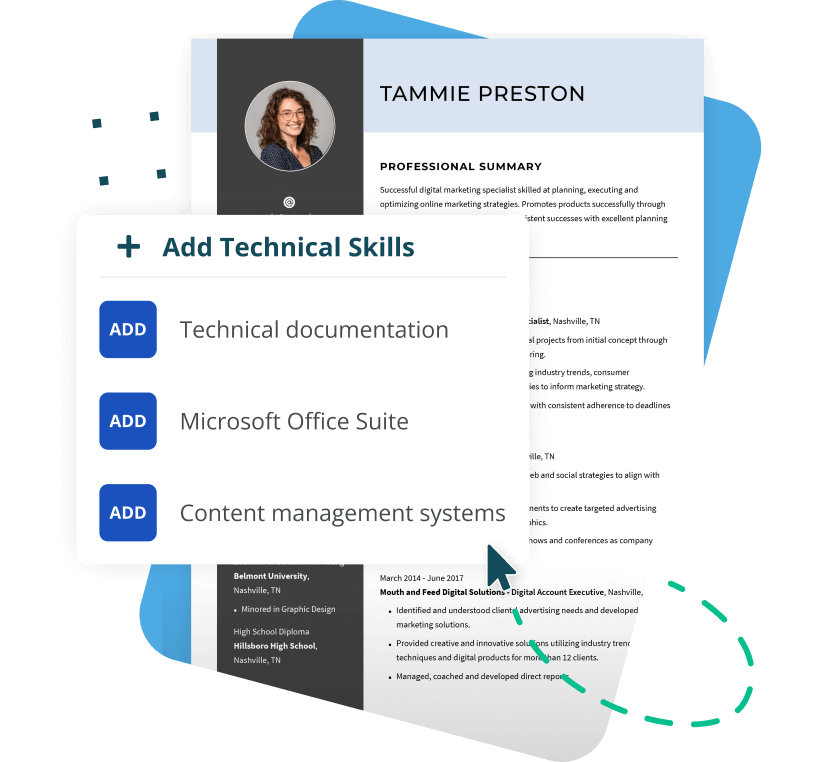- Featured in:
In today’s fast-paced digital environment, nearly every employer requires computer skills. With the increasing reliance on digital platforms, we’ll show you how to demonstrate your computer literacy effectively to potential employers! In this article, find top computer skills and examples and resources like our professional resume templates to perfect your application.
What Are Computer Skills?
Computer skills are a type of hard skill that refer to any specific ability that makes you particularly good at using computers, software, systems, apps or social media.
Almost every job in every industry involves using a computer interface to perform a function. Identifying and honing in on the kinds of computer skills or interaction a job requires will give you an edge over other candidates.
Computer skills also help you advance your career because they create the opportunity for a higher earning potential. With the ability to use digital programs, you can stand out from the competition and increase your chances for advancement.
List of Additional Computer Skills
The demand for computer skills has grown significantly. Listing basic computer skills on a resume is essential to increase your chances of landing an interview. Check out this list of computer skills examples that you can use.
- Google Analytics
- Search engine optimization (SEO)
- Photoshop and Illustrator
- Email marketing services
- Hubspot
- WordPress
- Google Workspace
- MS Office
- Google Drive
- Blogging
- Web development
- Open-source data structures
- Coding
- Cybersecurity
- Machine learning
- Debugging
- Algorithm development
- AI programming
- A/B Testing
- Virus monitoring
- Data compression
- Systems diagnostics
Computer Skills FAQ
What are computer skills?
Computer skills refer to any specific ability that makes you particularly good at using computers, software, systems, apps or social media.
The fact that it’s a hard skill means it’s an ability that is easy to measure, demonstrate or quantify. This is in contrast to soft skills — which include abilities like teamwork, communication, and leadership — that are harder to show or prove.
Computer skills also empower your research abilities and polish your presentation skills, marketing skills and analytical skills.
Computers can streamline the work of documenting your sources skills and help improve your writing skills.
Why are computer skills important for specific jobs?
Almost every job in every industry involves using a computer interface to perform a function. Some level of computer skills is necessary for every job!
Identifying and honing in on the kinds of computer skills or interaction a job requires will give you an edge over other candidates.
Industries including digital engineering, online marketing, programming and editing will require extensive computer skills and proficiency with the right computer languages.
Other jobs might be less tech-focused but still rely on computers to execute business.
For example, most restaurants use computerized ticketing and point-of-sale (POS) systems. While your ability to serve doesn’t wholly depend on the POS system, it’ll be much more likely that you get the job if you have some familiarity with specific systems and mention it in your hiring application.
What are the top 10 computer skills of 2023?
If you’re looking to advance your career by acquiring new technology skills in 2023, here are ten of the most in-demand computer skills:
Information technology (IT)
IT is the knowledge and use of any computers, storage, networking, infrastructure and processes to create, process, store, secure and exchange all forms of electronic data.
Cloud computing
Businesses rely on more efficient and effective ways to manage decentralized data and systems.
Artificial intelligence
A.I. allows you to use computer programs to perform tasks similar to human cognition and has the potential to accelerate aspects of how we live and work.
Cybersecurity
This job is growing fast. As a specialist in security analysis, you will be required to investigate and apply security for apps, clouds and networks.
Data science
Data scientists analyze data from various sources, including customer transactions, click streams and social media. These professionals unlock valuable and predictive insights to impact business decisions and for a competitive advantage.
Data analysis
Learn how to mine, clean, sort and process data to extract relevant and valuable information. This will create opportunities as a data analyst, consultant, business analyst, marketing analyst, and project manager.
Product management
A product manager is a person who identifies the customer need and the larger business objectives that a product or feature will fulfill. Seasoned candidates can earn up to $133,212 per year.
Software development
Software engineers with a robust skill set for software developers in 2023 include JavaScript, Python, Go, Java, Kotlin, PHP, C#, Swift, R, Ruby, C and C++.
Systems and networks
Make a career of constant emerging trends in computer systems and network technologies. You will also benefit from technical skills in cloud computing, containers and database management. Other technical skills include software-defined networking (SDN) and software-defined wide area network (SD-WAN) management.
Programming
Being able to program is essential. The most in-demand programming courses include Python, C++, JavaScript, Ruby and PowerShell.
How can I develop computer skills?
In 2023, having basic computer hardware and software skills is more important than ever.
To grow your computer skills, focus on courses specific to information and communications technology. Harvard offers free online courses or Coursera, which delivers programs that reach over 100 million learners worldwide.
Apply the knowledge and get hands-on practice. Develop basic IT concepts such as using spreadsheets, creating presentations and email marketing blasts.
You can improve your computer skills even from home! Consider goals like learning to design or create your site or blog or using social media to network.




